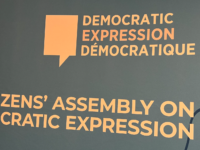The results of this summer’s online harms consultation remains largely shrouded in secrecy as the Canadian government still refuses to disclose the hundreds of submissions it received. Canadian Heritage Minister Pablo Rodriguez now leads the file, but he has said little about his department’s plans or explained why a public consultation should not feature public availability of the submissions. I have maintained an ongoing blog post with links to dozens of submissions that have been independently posted. While even a cursory review reveals widespread criticism, I’ve worked with the University of Ottawa law student Pelle Berends to do a deeper dive on the available submissions. This first post identifies the common concerns raised in the submissions with a chart breaking down the positions posted below. A second post will highlight frequently raised recommendations.

DANGER INTERNETS AHEAD by Les Orchard (CC BY-NC 2.0) https://flic.kr/p/cSsSX
Online Harms
The Law Bytes Podcast, Episode 109: Striking the Balance on Misinformation and Freedom of Expression – My Examination of Canadian Policy Solutions
The Canadian Parliament is set to resume this week and it’s a safe bet that Internet regulation will be part of the legislative agenda in the coming months. One of the toughest policy issues involve misinformation, which can be difficult to define and potentially to regulate. The Canadian Commission on Democratic Expression was established in spring 2020 with a three-year mandate to better understand, anticipate, and respond to the effects of new digital technologies on public life and Canadian democracy. As part of its work, it created a Citizens’ Assembly comprised of Canadians from across the country who recently gathered for several days to debate disinformation online. Last week, I was honoured to deliver a dinner speech to the group followed by a facilitated discussion. This week’s podcast features a recording of that lecture with the slides posted here.
The Law Bytes Podcast, Episode 104: Taylor Owen on What the Latest Facebook Revelations Mean for Canada’s Online Harms Legislative Plans
Facebook has once again found itself in the political spotlight as Frances Haugen, a former data scientist and product manager with the company turned whistleblower, provided the source documents for an explosive investigative series in the Wall Street Journal followed by an appearance before a U.S. Senate committee. The Facebook Files series comes just as Canada is moving toward its own legislative response to Internet concerns, with an online harms consultation that provides a roadmap for future policies.
The Canadian initiative has sparked widespread criticism, but recent events may only increase the calls for legislative action. Taylor Owen, the Beaverbrook Chair in Media, Ethics and Communications in the Max Bell School of Public Policy at McGill University joins the Law Bytes podcast to discuss the latest revelations and what they might mean for the future of Canadian Internet regulation.
Tracking the Submissions: What the Government Heard in its Online Harms Consultation (Since It Refuses to Post Them)
The Canadian government’s consultation on online harms concluded earlier this week with a wide range of organizations and experts responding with harshly critical submissions that warn of the harm to freedom of expression, the undermining of Canada’s position in the world as a leader in human rights, and the risk that the proposed measures could hurt the very groups it is purportedly intended to help. I posted my submission and pulled together a Twitter stream of other submissions.
There has been some press coverage of the consultation response from the Globe and Mail and National Post, but Canadian Heritage officials have said they will not post the submissions they received, claiming some “may contain confidential business information.” Keeping the results of the consultation is secret is incredibly damaging, raising further questions about whether the government plans to incorporate the feedback or simply march ahead with an extreme, deeply flawed proposal.
Failure to Balance Freedom of Expression and Protection from Online Harms: My Submission to the Government’s Consultation on Addressing Harmful Content Online
The government’s consultation on its proposed approach to address harmful content online concluded over the weekend. The consultation was one of several consults that ran during the election period and which raise questions about whether policy makers are genuinely interested in incorporating feedback from Canadians. I submitted to all the various consultations and will be posting those submissions this week.
I start with my online harms submission. The full submission, which touches on issues such as 24 hour takedowns, website blocking, proactive monitoring, and enforcement, can be found here. To learn more about the issues, catch my Law Bytes podcast episode with Cynthia Khoo or listen to a terrific discussion that I had together with Daphne Keller on the Tech Policy Press Podcast. The submission opens with eight general comments that I’ve posted below:











